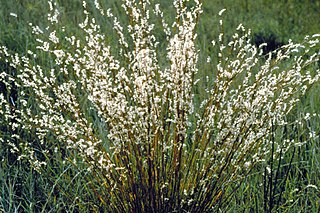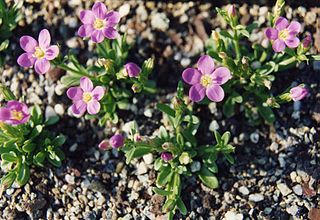
Centaurium (centaury) is a genus of 20 species in the gentian family (Gentianaceae), tribe Chironieae, subtribe Chironiinae. The genus was named after the centaur Chiron, famed in Greek mythology for his skill in medicinal herbs. It is distributed across Europe and into Asia.
Centaury is a common name for several plants and may refer to:

Schizachyrium scoparium, commonly known as little bluestem or beard grass, is a species of North American prairie grass native to most of the contiguous United States as well as a small area north of the Canada–US border and northern Mexico. It is most common in the Midwestern prairies and is one of the most abundant native plants in Texas grasslands.
Coslett Herbert Waddell (Rev.) was an Irish priest,, and botanist.

Hoplosternum littorale is a species of catfish belonging to the Callichthyinae subfamily of the family Callichthyidae. It is known as tamuatá in Brazil, atipa in French Guiana, hassa in Guyana, kwi kwi in Suriname, cascadu or cascadura in Trinidad and Tobago, and busco or currito in Venezuela.
Canarium littorale is a tree found in tropical Asia and is a member of the incense tree family Burseraceae. The specific epithet littorale is from the Latin meaning "of the seashore", referring to its habitat.

Schenkia sebaeoides, known as ʻĀwiwi in Hawaiian and lavaslope centaury in English, is a rare species of flowering plant. It is endemic to low shrublands in the state of Hawaiʻi in the United States. It is present on the islands of Kauai, Oahu, Lanai, Molokai, and Maui. At the time it was added to the endangered species list of the United States in 1991 it was known from seven populations for a total of fewer than 1000 individuals. It is threatened by habitat loss.
Pleiospermium is a genus of plant in family Rutaceae.

Centaurium erythraea is a species of flowering plant in the gentian family known by the common names common centaury and European centaury.

Zeltnera venusta is a species of flowering plant in the gentian family known by the common names California centaury, charming centaury and canchalagua. This centaury is native to much of California, southern Oregon, and northwest Baja California.

Schenkia australis is a species of annual herb in the Gentianaceae family. It is endemic to Australia.

Centaurium davyi is a species of flowering plant in the gentian family known by the common name Davy's centaury.

Centaurium pulchellum is a species of flowering plant in the gentian family known by the common name lesser centaury, or slender centaury. It differs from Centaurium erythraea by lacking basal rosette of leaves and by having a developed peduncle below the flowers. It is often much smaller, less than ten centimetres. It is native to the southern temperate parts of Europe.

Zeltnera is a genus of flowering plants in the gentian family. It was erected in 2004 when the genus Centaurium was split. Genetic analysis revealed that Centaurium was polyphyletic, made up of plants that could be grouped into four clades. Each became a genus. Centaurium remained, but it is now limited to the Eurasian species. The Mexican species now belong to genus Gyrandra, and the Mediterranean and Australian plants are in genus Schenkia. The new name Zeltnera was given to this genus, which contains most of the North American centauries. There are about 25 species.

Reveludden Nature Reserve is a nature reserve in Stockholm County in Sweden.

Centaurium scilloides, also known as perennial centaury is a flowering plant in the family Gentianaceae. It is native to Atlantic Europe and the Azores. Plants from the Azores have white flowers and are genetically different with some treating it as a different species.

Rhaponticoides is a genus of flowering plants in the family Asteraceae, found in northern Africa, southern and eastern Europe, and western Asia as far east as Mongolia. They were resurrected from Centaurea.

Andampy is a rural municipality in northern Madagascar. It belongs to the district of Antalaha, which is a part of Sava Region. The municipality has a populations of 6,843 inhabitants (2019).

Centaurium tenuiflorum, the slender centaury, is a species of annual herb in the family Gentianaceae. They have a self-supporting growth form and simple, broad leaves. Individuals can grow to 17 cm tall.
Centaurea leptophylla, the thin-leaved centaury, is a flowering plant in the family Asteraceae. The IUCN has classified the species as critically endangered. It is native to Turkey.















